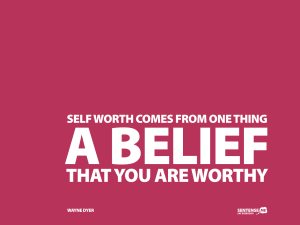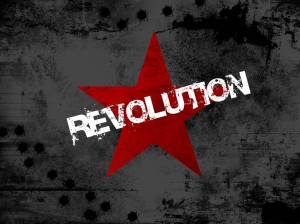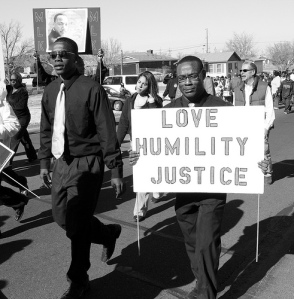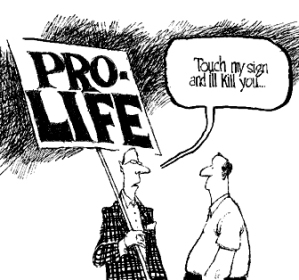 No one ever wants to talk about self worth. We talk about self esteem a lot, which is how we feel about ourselves against outward comparisons – “I can do a back flip,” “People think I’m pretty,” “I think I write pretty well.” – but we sort of ignore self worth. Self worth is how we feel about ourselves against inward comparisons – “Do I really need a new computer when I know people who could use the money?,” “Am I the jerk in the argument?,” “Am I more committed to discord than love?”
No one ever wants to talk about self worth. We talk about self esteem a lot, which is how we feel about ourselves against outward comparisons – “I can do a back flip,” “People think I’m pretty,” “I think I write pretty well.” – but we sort of ignore self worth. Self worth is how we feel about ourselves against inward comparisons – “Do I really need a new computer when I know people who could use the money?,” “Am I the jerk in the argument?,” “Am I more committed to discord than love?”
Imagine a society full of people afraid to face their own flaws. When I think about it, I imagine a place of materialism and consumerism, because it’s always easier to buy something new than to actually ask yourself if there’s a better use for your money. I imagine a society whose politicians work for special interests groups rather than their constituents. I see a world where people would rather watch a group of New Jersey guidos debauch themselves than spend an hour educating themselves about the blood diamond trade in Africa, or the crisis in Haiti, or sex trafficking in America.
Obviously we’re that society. We’ve grown up being told that we’re the best, and we believe it. We grasp it so tightly because we have so little self worth. Look at the celebrity breakdowns and deaths that have occurred over the past decade. Most of these individuals have more money than they know what to do with. They have everything, and yet they are so defined by outside stimuli, that as soon as the constant ego fanning goes away, they have nothing inside of themselves to which to turn.
Much of Christianity today teaches that our identity is to be found in God and, as you’ll see, I believe that to be part of it, but self worth is something that needs a resurgence in the Church. Furthermore, a large percent of Western Christianity equates worth with outside stimuli as well (your church attendance record, how often you pray and read the Bible, if you raise your hands during worship, etc.).
Here’s a popular scenario in many Christian groups: Sam does a guitar solo during a praise song, and it’s really good. He practices his guitar at least four hours a day, and usually spends the rest of his evening actually jamming with it. After the service John approaches Sam and says – “Hey man, that was an awesome solo today. You’re getting really good.” – To which Sam replies – “It’s all God man. I’m just the vessel he uses.”
I would put copious amounts of money on it that similar conversations happens worldwide every Sunday at least, and it is an annoying one. There’s nothing bad about giving praise to God if you’re so inclined, but there is a difference between feeling as if God as blessed you with a talent and the hard work that you actually put into it to build that talent. If you work hard to reach a goal, it’s okay to accept your part in that.
Both Jesus and the Torah teach that we are to love ourselves. In Islam the Hadith teaches the same thing, as do the teachings of Buddhism.
Self worth is not the same as ego
 Ego is harsh. Ego says “you’re the best…you can nail this meeting,” but if you don’t nail the meeting, you walk away hating yourself. As dynamic, multi-faceted beings, our ego is necessary. It is the shell that protects our true selves. Without ego, progress would never happen. But ego can very quickly get out of hand. Not only that, but people too often stop at establishing their ego.
Ego is harsh. Ego says “you’re the best…you can nail this meeting,” but if you don’t nail the meeting, you walk away hating yourself. As dynamic, multi-faceted beings, our ego is necessary. It is the shell that protects our true selves. Without ego, progress would never happen. But ego can very quickly get out of hand. Not only that, but people too often stop at establishing their ego.
Self worth is not the same thing. Self worth is how you feel about yourself when lying in bed following the crappiest day you’ve ever been an active participant in. Making excuses for the day and your role is ego; not being able to sleep because you’re guilt ridden is low self worth; realizing that you made mistakes and determining to work on those issues is the road to healthy self worth.
The Jewish sages taught that God is in us, experiencing life through us, and that self worth is very important to Him, because He created us to live healthy internal lives. What must it do to the spirit of God within us when we hate ourselves?
Much of religious teaching today wants to jump to the end. Christianity seems to teach “accept Jesus and you’re automatically worthy,” and on a metaphysical level perhaps this is true, but that’s not how it works to us constrained by things like time and linear progression. Racists don’t wake up and stop being racists overnight, and people don’t stop hating themselves at an altar call. Self worth is a journey of discovery about oneself.
It’s sad that in a culture so desirous of relationship, we never take the important step of having a relationship with ourselves. We spend so much time getting to know others…their flaws, their values, their likes…but we never stop to get to know ourselves. It doesn’t come naturally. My children default to making excuses rather than taking responsibility for their actions and recognizing their own flaws. I have to teach them the proper way, and that’s how it should be, but most people are never taught how to do that. Most people experience life on the level of self-esteem and ego, but very few actually do the very hard work of experiencing life on the level of self worth.
So how does one take that journey?
Kabbalah teaches that self worth comes from service. Jesus teaches the same thing. When you lead a life of service, what you’re really doing is reminding yourself that you are not the center of the universe…that it’s not about you. Just take a look at the politicians who obviously have their own interests in mind versus those who genuinely care about the interests of the people. Better yet, take a look at the missionaries you may know. Think about their lives. Now, take those who are more like glorified tourists (their interests lie in seeing the world, collecting cool memorabilia, being a missionary pastor, etc.) and compare them with those who are in the trenches actually serving people (their interests lie in feeding their neighbors, educating the poor, changing lives, etc.). The glorified tourists will immediately defend their lifestyles, while the true missionaries will graciously keep their mouths shut to your criticism as long as you’re willing to help with the practical work.
Part of the journey is also to find and recognize your place in this world. To find your role, if you would. In Christianity we often refer to this as your “calling,” but that over spiritualizes it. Not being a Christian should not preclude you from having a role in this world, and not everyone is called for grand things, no matter how much we’re taught that we can all be astronauts and doctors. For some people the purpose is to be a loving mother or father. Some people are meant to mentor others. Some people are meant to work hard every day of their lives without ever uttering a complaint. When you recognize your place, things just click on the inside. You become a different person, and life all of the sudden begins to just flow. You stop worrying about tomorrow, because you know who you are today.
And an amazing thing happens once you start the journey of self worth – you begin to see the worth in others, which then helps you serve better, which increases your self worth, which helps you find even more worth in others, which helps you serve them even better, and on, and on, and on.
So again, the secret is service. Self worth is not a measure of how others treat you, it is a measure of how you treat others.
 These are my sweatpants that I’ve had since college. I’ve lost more money than the original price of these pants, but I’ve never lost them. I love them.
These are my sweatpants that I’ve had since college. I’ve lost more money than the original price of these pants, but I’ve never lost them. I love them.








